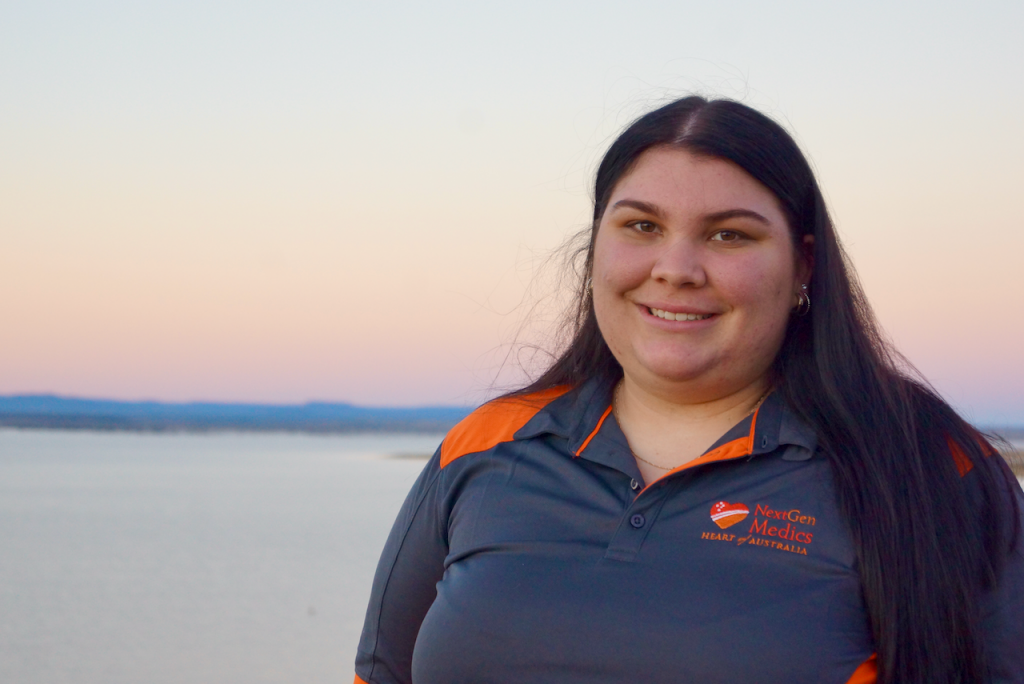
NextGen Medics student alumni Lavena Wills has always dreamed of going rural when she graduates with her degree in Exercise Physiology. But she didn’t know the mechanics of making it happen or what practising allied health in rural and remote communities might look like.
Then she was accepted into Heart of Australia’s NextGen Medics student experience program.
Lavena is a proud Bigambul, Ewamian and Kukatji woman. Born and raised in Yuggera and having spent many years growing up in Wakka Wakka (Queensland), Lavena already understood the joys and the challenges of living in rural, regional and remote Australia – including the challenge of accessing health care. She hoped the NextGen Medics program would enhance that understanding by showing her what it’s like practice healthcare delivery in similar communities.
“I was hoping to see what it was like to experience medicine out in the country, in the remote and rural communities, and that’s exactly what I learned, and so much more. It was a real learning journey.
“To start with, I was completely surprised by the Heart Trucks. I had no idea how sophisticated they were, the impressive amount of medical equipment and supplies onboard or how many services the doctors, specialists, and health workers could do on the truck.
“I was surprised by how appreciative the country patients are for the health care they receive. They’re so happy and so thankful that they don’t have to travel to a big city to access the health services they need. It shocked me just how thankful they are, especially in contrast to people in the city – if I run out of medication at home, I’m annoyed at having to drive five minutes away to my GP to get a new prescription. Some people out here would kill to have that problem. It really changes your perspective. You can read about health inequality for people living in rural and remote communities in your uni classes, but you don’t truly understand it until you see it first-hand.
“The Heart Trucks play an important part in fighting that inequity. You talk to people out here, and they’ll tell you – many will put off their healthcare needs unless a truck comes into a town close to them. I say ‘close’, but I’ve spoken to patients who have happily driven over 100km to come to their appointment on the truck. They’re willing and able to drive 100kms, which they can do in a day. That change in the distance makes all the difference – and not having to find the time and money for flights, long drives, accommodation and someone to look after their homes, family and responsibilities. Having spoken to people out west, they’ve told me that many of them wouldn’t or couldn’t make that big trip. They’d stay home, not get the healthcare they need, and leave it until it’s way too late – which is not good. It’s very dangerous.”
When asked to list her highlights from the program, Lavena said there were too many to mention. However, when we insisted, she managed to pick her favourite moments.
“To start with, it’s way more hands-on than I thought it would be. I thought it would be more shadowing and watching, but the program pushes you straight into the deep end, which is really good – being hands-on with patients and putting your uni skills to work in a unique mobile setting. “Then there’s the Theodore Medical Centre. The way they engage with and incorporate Indigenous healthcare into their practice is absolutely amazing. There’s still a long way to go for health equity for Indigenous patients and communities throughout Australia, but the steps Theodore Medical has taken is impressive and inspiring.
“Our visit to Emerald Hospital was also eye-opening. I love how the medical team appreciate the value of Allied Health, take a holistic approach, and work as a whole team side by side with the Allied Health professionals. They have the whole team speak to the patient together, so the patient only needs to tell their story once, rather than retelling it over and over again each time a new doctor or healthcare worker arrives. It was a really great example of how they are all about putting their patients first. I loved that.
When asked how important the NextGen Medics program is to the future of rural and regional healthcare, Lavena was very clear.
“The NextGen Medics program is already doing incredible things to help get doctors and allied health professionals to go rural.”
“It’s so important students get to come and experience not just one rural community, but many – so they can find the right one for them. I think Anne Chater from the Theodore Medical Centre explained it really well. She said to us, “when you’ve seen one rural town, you’ve seen one rural town – you have not seen them all” – which is exactly right.
“Every town has its pros and cons. And when you get to visit several of them, see them in action and understand them, you can find the right match with what you want in a home and work life in the future as a rural health professional. If one community is not for you, there’s definitely another community that will be the right fit.
“Australia needs more doctors and health workers in rural and remote communities. NextGen Medics is playing a crucial in encouraging students to go rural in their future.
“It’s motivated me so much. You make connections with doctors and specialists, health workers and patients, and they inspire you. They make you want to hurry up and finish your degree so you can get out there as soon as possible to help address the health gap in the rural communities.
“I always knew that I wanted to go rural, but by the end of the first Block, any nagging doubts I had were gone – I’m definitely going rural as soon as I can.
